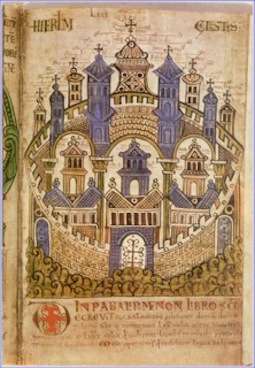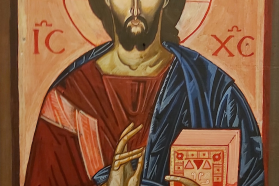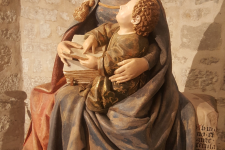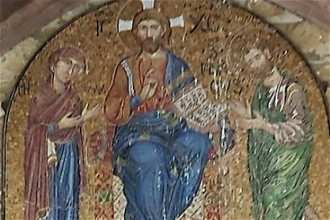Sunday Reflection with Fr Robin Gibbons - 1 December 2019

First Sunday of Advent
Many of you will know the magnificent anthem by Hubert Parry, I was Glad, his setting of our responsorial psalm (Ps 122) on this first Sunday of Advent . It has an ancient liturgical role as an introit psalm at the Coronation of English monarchs, but Parry's setting was famously sung at the Coronation of our Queen Elizabeth II with its rousing Latin insertion, Vivat, Vivat Vivat Regina Elizabetha coming just after verse three: 'Jerusalem, built as a city with compact unity' - or as the Authorised version puts it; 'Jerusalem is built as a city : that is at unity in itself'. If you haven't heard that setting, I recommend it, for Parry's music has an immense capacity to lift the spirits and emotions, but it also gives us an enormous sense of anticipation and hope!
This Psalm, 122, has perhaps another setting, one which each of us has to compose in their heart, it's more of an inner song of our own anticipation, one we sing to ourselves and God, the opening two verses take us to the place we need to start:
'I rejoiced because they said to me,
"We will go up to the house of the LORD."
And now we have set foot
within your gates, O Jerusalem'.
We are going to the Holy City, our home, we are filled with that mixture of true expectation, initial fear and bewilderment that leads to joyful hope. We learn to rejoice in ourselves to when we set out on the journey of faith our horizon is that place where we shall be with the Lord.
What has this to do with Advent? Well everything, for as we know the deeper song of Advent is not about Christmas or the Nativity, but of a search in waiting expectation. We seek the Lord so that we are ready and waiting for his coming again, our anticipation is that of being alert, open, poised to meet him now! The letter to the Romans puts it succinctly: 'it is the hour now for you to awake from sleep. For our salvation is nearer now than when we first believed; the night is advanced, the day is at hand. Let us then throw off the works of darkness [and] put on the armour of light.' (Rm 13:11,12)
Time is pressing, we cannot afford to rest and relax in the cares of our world for too long, Advent bids us lift up our heads and hearts and look into the sky, metaphorically and physically, for there is the coming Christ of the Cosmos, the glimpse of the New City!
Jesus himself speaks of this moment of encounter as sudden, immediate and precipitous, for relationships, activities, livelihoods all will be disturbed, it is the moment of transformation and eternal change. Jesus says it directly: 'Therefore, stay awake! For you do not know on which day your Lord will come'.(Mt 24:42)
We often pray and sing about this event without thinking, but the psalmist knows that we are already on the way to that New Jerusalem, a place of unity, prosperity and peace. That is a vision of hope, not one of despair and punishment, and this is very much needed in our Church and world! Our task this Advent is to prepare our hearts and others for the coming of that Cosmic Lord of love. 'Let us be glad, let us go rejoicing to the house of the Lord'!
Meditations
1. Thomas Merton
Advent, Seasons of Celebration
I begin to live in Christ when I come to the 'end' or to the 'limit' of what divides me from my fellow man;
when I am willing to step beyond this end, cross the frontier,
become a stranger, enter into the wilderness which is not 'myself,' where I do not
breathe the air or hear the familiar, comforting racket of my own city, where I am
alone and defenceless in the desert of God.
2. Benedict XVI on Psalm 122
General Audience
Weds 12th October 2005
'The Psalm thus traced an ideal portrait of the Holy City with her religious and social function, showing that biblical religion is neither abstract nor intimistic, but a leaven of justice and solidarity. Communion with God is necessarily followed by the communion of brothers and sisters with one another.
4. We now come to the final invocation (cf. v. 6-9). It is marked throughout by the Jewish word shalom, "peace", traditionally considered to be the etymological root of Jerushalajim, the Holy City itself, interpreted as "city of peace".
It is well known that shalom alludes to the messianic peace that in itself brings joy, prosperity, goodness and abundance. Indeed, in the pilgrim's final farewell to the temple, to the "house of the Lord our God", he adds "good" to "peace": "I will ask for your good" (v. 9). This anticipates the Franciscan greeting: "Peace and good!" We all have something of a Franciscan soul. This greeting expresses the hope that blessings will be poured out upon the faithful who love the Holy City, upon the physical reality of its walls and buildings in which the life of a people pulsates, on all its brothers and sisters and friends. In this way, Jerusalem will become a hearth of harmony and peace.
5. Let us end our meditation on Psalm 122[121] with an idea for reflection suggested by the Fathers of the Church for whom the ancient Jerusalem was the sign of another Jerusalem, also "built as a city strongly compact".


















